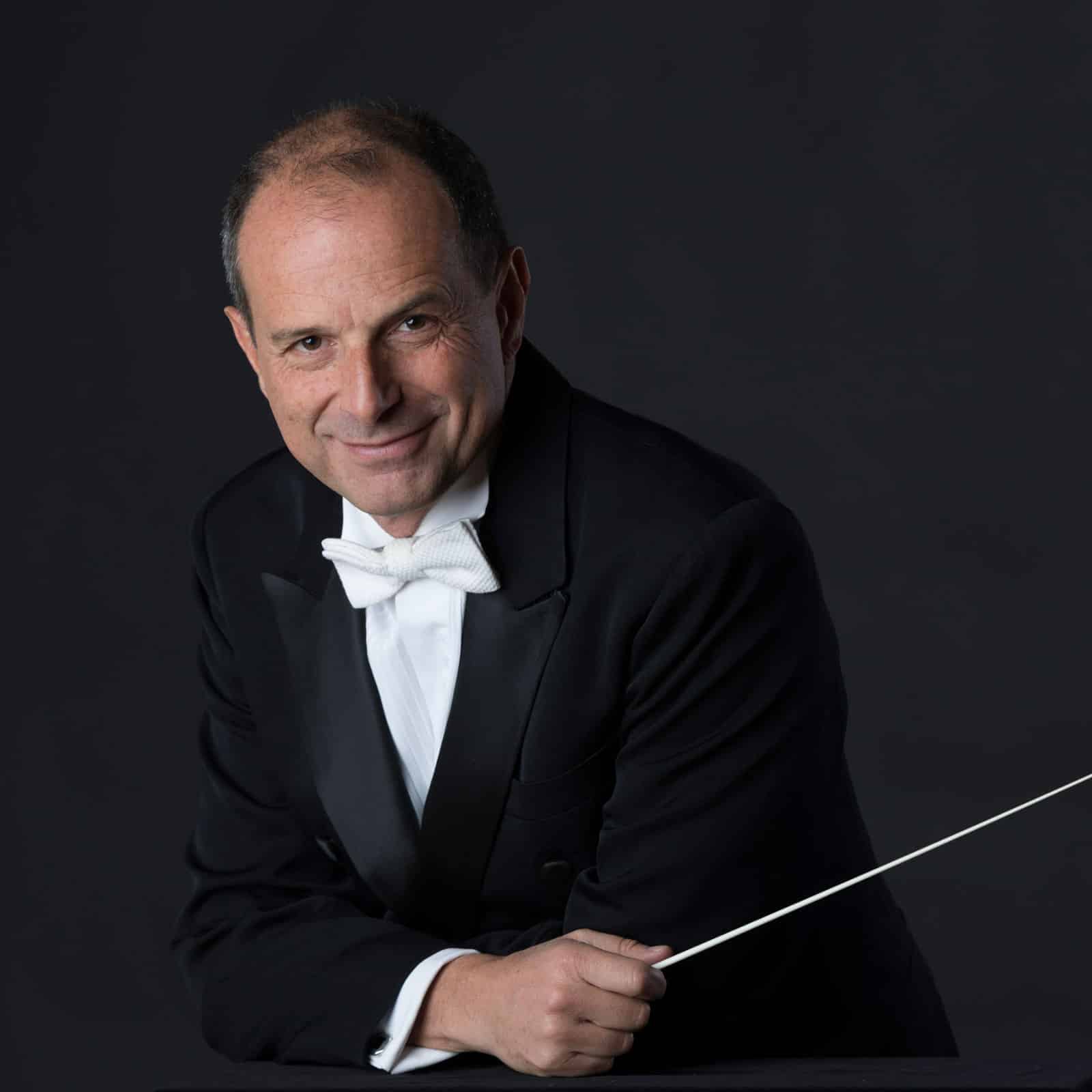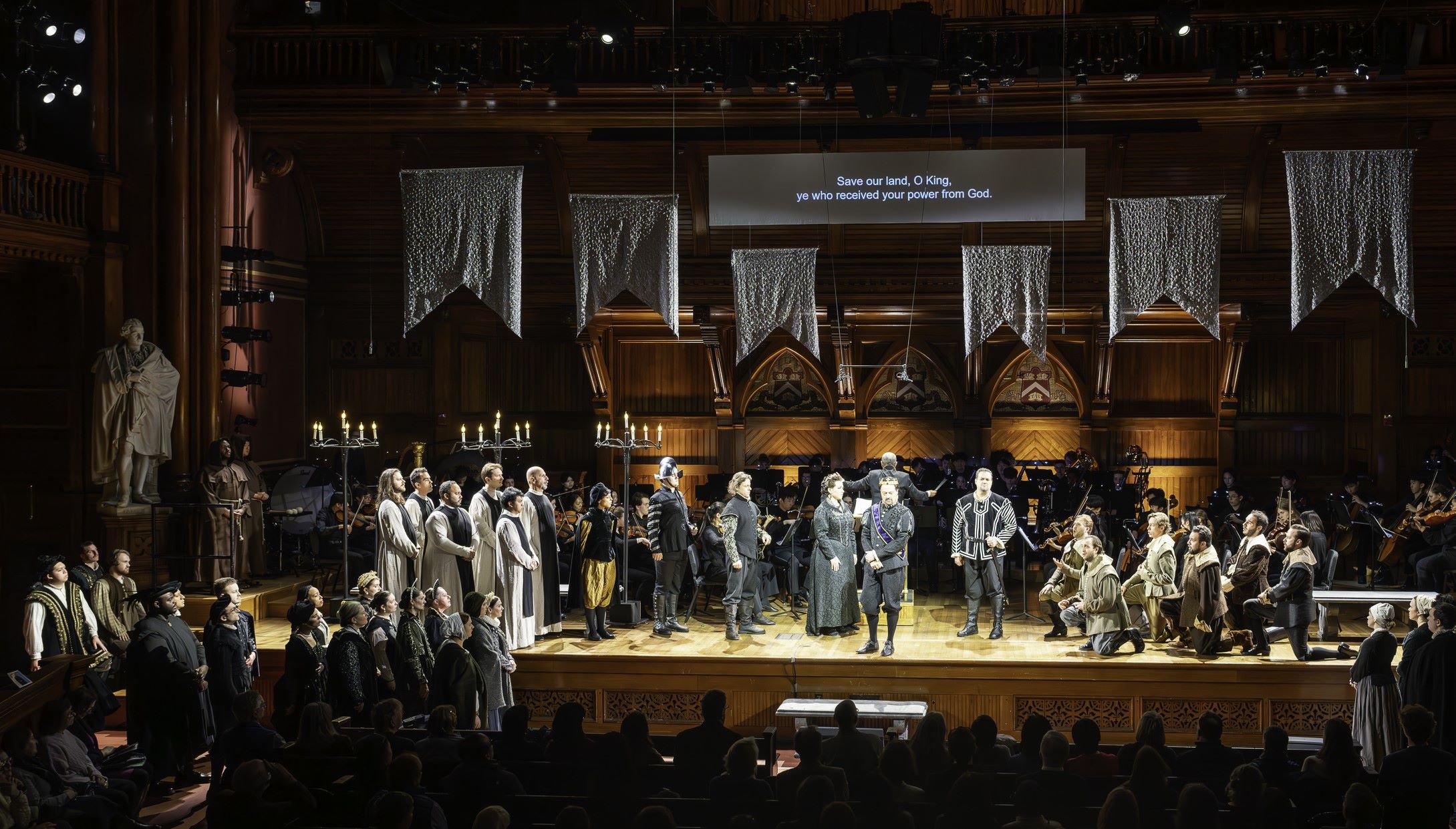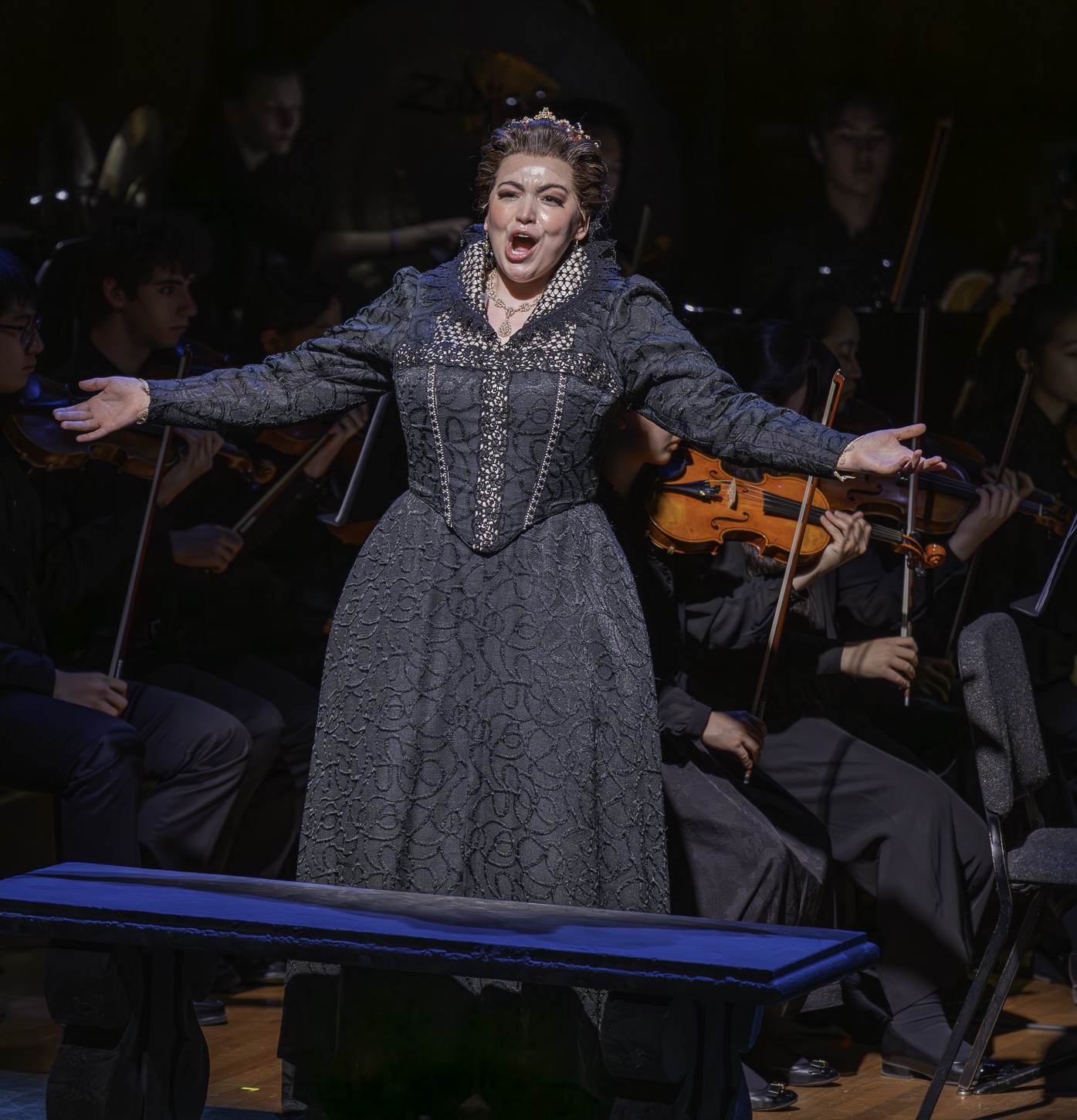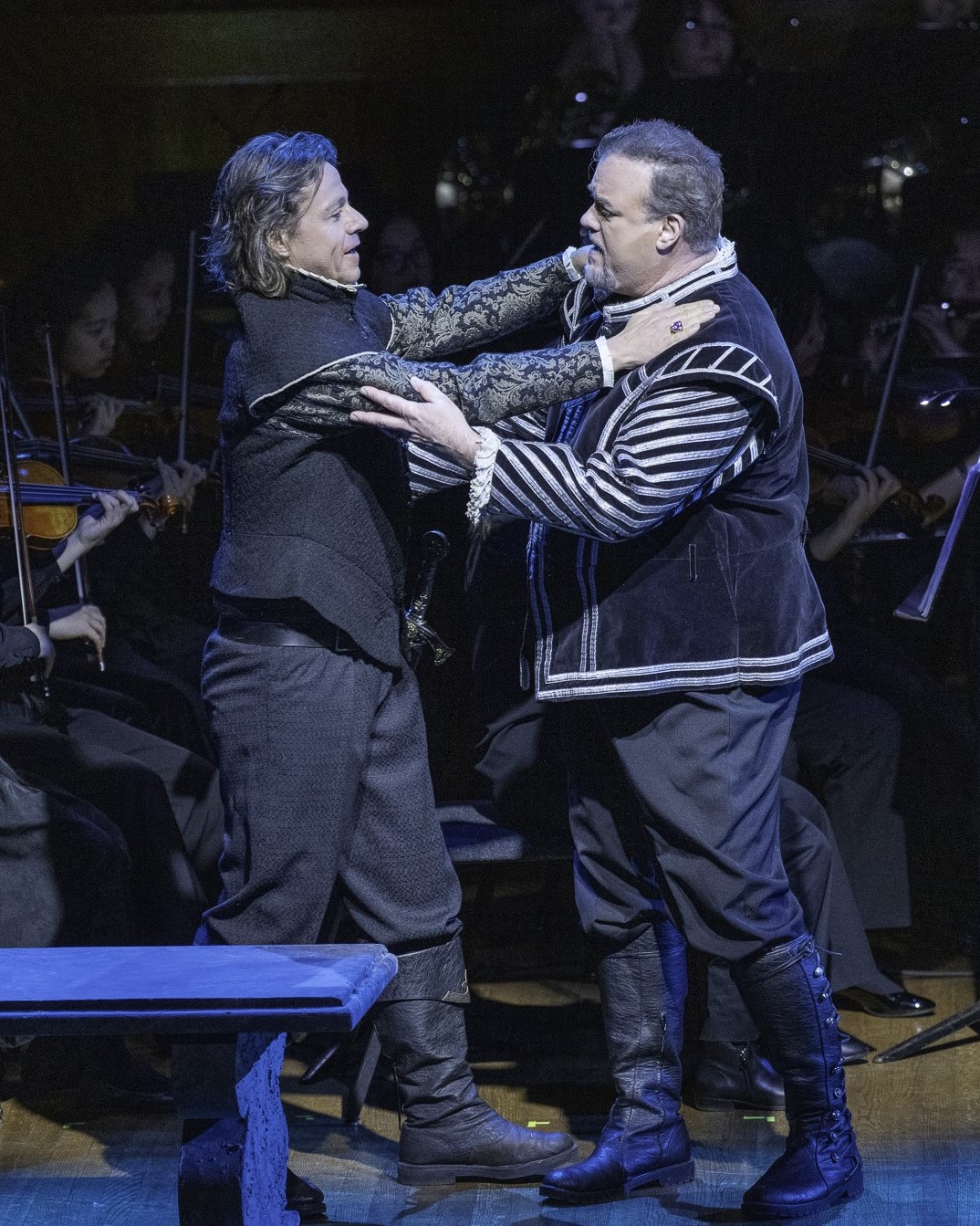Reviews
Youth Orchestra Delivers the Best
Don Carlo in Over 50 Years.
 BOSTON—Those of us who have a special place in our hearts for Verdi’s Don Carlo must count ourselves lucky. For his annual semi-staged opera with the Boston Youth Orchestra, Federico Cortese conducted what may be Verdi’s most ambitious opera in its final (and shortest) version. It was the most exciting and satisfying live performance of Don Carlo I’ve experienced since 1973 when Sarah Caldwell staged the American premiere of Verdi’s longest version, written for its premiere in Paris and including an hour more of music. (The Metropolitan Opera finally got around to that French iteration in 2022.)
BOSTON—Those of us who have a special place in our hearts for Verdi’s Don Carlo must count ourselves lucky. For his annual semi-staged opera with the Boston Youth Orchestra, Federico Cortese conducted what may be Verdi’s most ambitious opera in its final (and shortest) version. It was the most exciting and satisfying live performance of Don Carlo I’ve experienced since 1973 when Sarah Caldwell staged the American premiere of Verdi’s longest version, written for its premiere in Paris and including an hour more of music. (The Metropolitan Opera finally got around to that French iteration in 2022.)
Cortese has never been shy in his choices. In his 13 years of opera with his student orchestra, this was his eighth Verdi, including the composer’s three Shakespeare operas along with Rigoletto, La traviata, Un Ballo in Maschera, and Aida. Last year he took on Bellini’s Norma, which made my Best of 2024 list. No other opera company in Boston since Caldwell has come near presenting so much grand opera.
The great challenge of Don Carlo is casting its six leading roles. Happily, Cortese met that challenge. In the title role of the idealistic (hence doomed) prince of Spain, son of King Philip II, tenor Bruce Sledge, created an immediate heroic presence in the opening tomb scene. The title role can often be the least interesting; frustrated at every turn, Carlo seldom calls for much acting. But Sledge’s big, bright sound demanded attention. And with the impressive baritone Junhan Choi in the relatively thankless role of the mysterious friar (who might be the ghost of Carlo’s royal grandfather), that first scene had an unusually powerful impact. Sledge’s liability is that his clarion tone can become monochromatic. But he delivers on power—and sincerity.

Boston Youth Orchestra's semi staging of Verdi's Don Carlo at Harvard's Sanders Theatre
The next figure Carlo meets in the crypt is his bosom friend Rodrigo, Marquis of Posa, the real brains behind the rebellion against Catholic Spain’s royal tyranny. Their first duet of friendship is the first of this opera’s unstoppable stream of melodic earworms. Baritone Markus Werba has a beautiful tone and he’s a sensitive actor. Singing with Sledge, he initially sounded underpowered, but the voice grew, such that Rodrigo’s final aria, when he is assassinated by the Inquisition, was one of the afternoon’s high points.
 Something similar happened with soprano Raquel González, as Elisabetta, Filippo’s queen, who was once engaged to Carlo, whom she still loves. González’s exquisite tone flowered in her farewell aria to her banished handmaid (soprano Sarah Joyce Cooper, who sang excellently), and increased in intensity in her magnificent final aria of despair, “Tu che le vanitá” (You who know the world’s vanity) and her heartbreaking farewell duet with Carlo.
Something similar happened with soprano Raquel González, as Elisabetta, Filippo’s queen, who was once engaged to Carlo, whom she still loves. González’s exquisite tone flowered in her farewell aria to her banished handmaid (soprano Sarah Joyce Cooper, who sang excellently), and increased in intensity in her magnificent final aria of despair, “Tu che le vanitá” (You who know the world’s vanity) and her heartbreaking farewell duet with Carlo.
The audience favorite was clearly mezzo-soprano Maire Therese Carmack in the impossible role of Princess Eboli, Filippo’s vain mistress who is secretly in love with Carlo. Impossible because the role’s two big arias are so completely different that one singer can rarely pull them both off successfully. But Carmack sang The Veil Song, the deceptively light coloratura ballad,and the searing, self-castigating aria “O don fatale” (Oh, fatal gift!) with equal control, power, and affect.
As the conflicted king, baritone Nathan Berg (an overwhelming Bluebeard in Bartók’s Bluebeard’s Castle with the Boston Symphony Orchestra last year) had what is perhaps the hardest role. The King of Spain is all powerful, except that he has to bow to the Church. His argument with the nearly blind (in more ways than one) Grand Inquisitor (stirring bass Matthew Anchel), over who has the real power is the intellectual and emotional heart of Don Carlo. Berg and Anchel’s musical duel built relentlessly.
 Director Joshua Major’s “semi-staging,” in front of the large orchestra, had more intelligent and dramatic interaction among the characters than most full-scale productions. The elaborate costumes and mostly dark lighting (the musicians had lights clipped to their music stands) were extremely atmospheric, with the chorus both onstage and surrounding the audience from both sides of Harvard’s Sanders Theatre. Liv Redpath’s glorious soprano as the Celestial Voice floated down from the balcony, to create a glowing climax to the grim but thrilling auto da fé.
Director Joshua Major’s “semi-staging,” in front of the large orchestra, had more intelligent and dramatic interaction among the characters than most full-scale productions. The elaborate costumes and mostly dark lighting (the musicians had lights clipped to their music stands) were extremely atmospheric, with the chorus both onstage and surrounding the audience from both sides of Harvard’s Sanders Theatre. Liv Redpath’s glorious soprano as the Celestial Voice floated down from the balcony, to create a glowing climax to the grim but thrilling auto da fé.
One complaint: Major could have given Berg better direction for Don Carlo’s most profound aria, Filippo’s “Ella giammai m’amó” (She no longer loves me), in which kingly outrage has to balance personal tragedy. But kingly manner was hardly to be found; this Filippo looked like a pitiable fellow lamenting lost love, undercutting Verdi’s true power.
But it was Cortese’s conducting that carried the day. He leads from within the music—making it throb and soar, shaping musical phrases, and above all delivering the sweep of the whole epic scale, balancing sudden introspection with grand historical forces. The orchestra’s strings sounded particularly good, and I’ve (almost) forgotten the first few sour notes in the brasses in the context of this otherwise deeply gratifying enterprise.
Photos from the top: Conductor Federico Cortese; Raquel González as Elisabetta;
Markus Werba as Rodrigo (left) and Bruce Sledge, as Don Carlo.
Production photos by Michael J. Lutch
Classical music coverage on Musical America is supported in part by a grant from the Rubin Institute for Music Criticism, the San Francisco Conservatory of Music, and the Ann and Gordon Getty Foundation. Musical America makes all editorial decisions.





 FEATURED JOBS
FEATURED JOBS

 RENT A PHOTO
RENT A PHOTO


